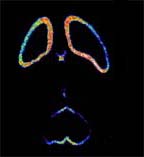Research in the Zoeller Lab
Thyroid hormone is essential for normal brain development. The main focus of research in the laboratory is to understand the molecular mechanism(s) by which thyroid hormone affects brain development and brain function. We pursue this goal within the context of two large projects. First, we are cloning genes expressed in the fetal brain that are regulated by maternal thyroid hormone. These genes have led us to examine the effect of thyroid hormone on cortical cell proliferation, differentiation and fate specification. Second, we are examining the mechanisms by which thyroid hormone action can be disrupted by polychlorinated biphenyls (PCBs). These chemicals are structurally similar to thyroid hormone. PCBs are know to affect neural development and they can alter circulating levels of thyroid hormone. Details of these projects are described below.
Specific Projects

Thyroid Hormone and Brain Development
Although it is very well-accepted that thyroid hormone is essential for brain development, the mechanisms by which thyroid hormone exerts its effects, the timing of these effects, and the developmental processes affected by thyroid hormone, are not well-understood. Our work is focused on understanding the role of thyroid hormone in early cortical development. This is the period before the onset of fetal thyroid function, which clearly demonstrates that thyroid hormone of maternal origin can affect fetal brain development.

PCB Disruption of Thyroid Hormone Action
Polychlorinated biphenyls (PCBs) are known to produce neurological deficits in exposed children, and this effect is associated with thyroid hormones. PCBs also reduce circulating levels of thyroid hormone in animals. However, it is not well understood whether PCBs interfere with thyroid hormone action. Our work seeks to understand the mechanisms of PCB effects on thyroid hormone action and the consequences of this interference.